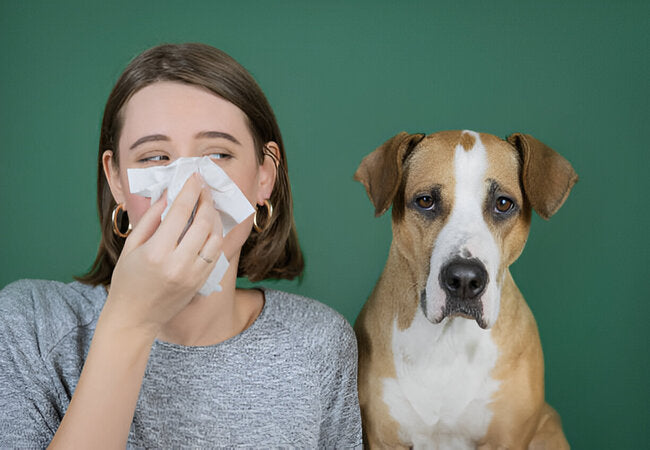2025 Vet Guide: Bad Breath in Dogs – Causes, Diagnosis & Freshening Tips 🐶🦷

In this article
2025 Vet Guide: Bad Breath in Dogs – Causes, Diagnosis & Freshening Tips 🐶🦷
By Dr. Duncan Houston BVSc
Persistent foul breath—or halitosis—is more than a nuisance—it’s often a sign of a deeper health issue. Let’s explore the most common causes, when to seek veterinary help, and how to restore your pup’s fresh smile. 👅
🔍 1. Why Bad Breath Happens
- Plaque & tartar buildup: Bacterial growth on teeth leads to gingivitis and periodontal disease, a top cause of halitosis.
- Oral disease & infections: Bleeding, abscesses, tumors, and mouth sores can all emit foul odors.
- Diet & scavenging: Diets rich in carbs and processed foods or ingestion of trash, feces or rotten items can cause temporary bad breath.
-
Medical disorders:
- Kidney disease: Urine-like or ammonia scent.
- Diabetes: Sweet or fruity odor from ketones.
- Liver disease: May emit sulfuric or “rotten” breath.
- Respiratory infections: Sinus and throat infections can contribute unpleasant odors.
- Anal gland or skin issues: Infections or impacted glands can also affect overall odor.
⚠️ 2. When It’s Time for the Vet
Bad breath with these signs requires a veterinary check-up:
- Persistent, offensive odor not improved by brushing
- Drooling, bleeding gums, mouth pain, difficulty eating
- Appetite changes, weight loss, excessive thirst, or urination
- Breath smells like urine, ammonia, fruit, or sulfur
🩺 3. Veterinary Diagnostics
- Oral exam under sedation to assess plaque, disease, and masses.
- Full dental cleaning and possible X‑rays.
- Bloodwork to check kidney, liver, metabolic, and endocrine functions.
- Hormone and glucose testing for diabetes/hepatic disease.
- Oral biopsy or culture when inflammation or tumors detected.
🛠️ 4. Treatment & Management
- Scaling & polishing: Removes plaque and tartar above and below the gumline—essential for halting periodontal disease.
- Extractions: Remove severely diseased teeth that threaten overall health.
- Medications: Antibiotics, pain relief, anti-inflammatories, or topical treatments for periodontal or skin issues.
- Address organ disease: Specific care for kidney, diabetes, or liver dysfunction.
- Toxic ingestion: Treat poisoning or foreign object ingestion promptly.
✨ 5. At‑Home Freshening Strategies
- Brush teeth nightly with veterinary-formulated dog toothpaste.
- Provide dental chews or VOHC-approved treats like Greenies.
- Use water additives with proven efficacy. Look for the VOHC seal.
- Offer crunchy dental diets or kibble designed to scrub teeth.
- Rinse or wipe the mouth with pet-safe wipes or gentle chlorhexidine solutions.
- Encourage safe chew toys to mechanically clean teeth.
🏡 6. Prevention & Long-Term Care
- Brush at least several times weekly—daily is ideal.
- Schedule annual dental exams with cleanings as needed.
- Feed a balanced diet; avoid garbage and table scraps.
- Maintain systemic wellness—regular vet check-ups to catch organ concerns early.
- Track oral health progress with tools:
- Ask A Vet: Get remote advice on odor concerns.
- Woopf: Log breath condition, habits, vet visits.
- Purrz: Set reminders for brushing, dental checks.
📚 FAQs
Q: My dog’s breath is bad sometimes—do I need to worry?
Occasional “doggy breath” after meals can be normal. But persistent or foul odors warrant veterinary attention.
Q: Are dental chews enough?
Chews help, but don't replace brushing and professional cleanings—combine them for best results.
Q: When should fresheners be avoided?
If your dog has an ongoing oral infection or systemic disease, fresheners may mask rather than treat the cause. Focus on veterinary treatment first.
💬 Owner Insight
> “After our Maltese’s dental cleaning, his breath was so bad you could smell it from across the room. Months later, with brushing and Greenies, it smells fresh and even better than before!”
🏁 Final Thoughts from Dr Houston
Foul breath is often your dog’s first warning signal. With early dental care, veterinary evaluation, and at-home strategies, you can prevent disease and refresh their smile. Tools like Ask A Vet, Woopf, and Purrz help keep track of oral health and ensure consistent care into 2025 and beyond. 💙🐾
Download the Ask A Vet app for advice, reminders, and professional support anytime. 📱
AskAVet.com – Keeping mouths fresh and hearts healthy.






